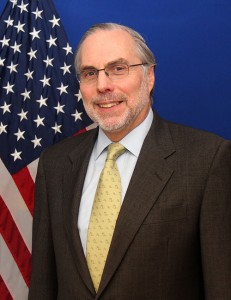 DEGREE: B.A. in political science; master’s in African studies, UCLA; master’s in public administration, UCLA; all but dissertation for Ph.D. in development studies, University of Wisconsin, Madison
DEGREE: B.A. in political science; master’s in African studies, UCLA; master’s in public administration, UCLA; all but dissertation for Ph.D. in development studies, University of Wisconsin, Madison
JOB TITLE: USAID mission director, South Sudan
FAVORITE TRINITY MEMORY: Various adventures with long-standing roommates: road trips to New York, late-night sessions solving the world’s problems, late-night sessions relaxing from having solved those problems
What is USAID? The United States Agency for International Development (USAID) is the lead U.S. government agency that works to end extreme global poverty and enable resilient, democratic societies to realize their potential. U.S. foreign assistance has always had the twofold purpose of furthering America’s interests while improving lives in the developing world. Established in 1961 by President Kennedy, USAID works in over 100 countries and in many sectors–health, education, economic growth, agriculture, private sector promotion, infrastructure, democracy and governance, conflict prevention and mitigation, environmental sustainability, and humanitarian emergency assistance. The agency is composed of about 1,300 Foreign Service officers, 1,100 civil service officers, and 4,600 Foreign Service national officers (staff in our host countries).
What does your job entail? My job has four components:
- Defining and overseeing the implementation of USAID’s development program for South Sudan. On an annual basis, we provide $300 million in development assistance and $200-$300 million in humanitarian assistance (to address food and other crises). The office has 45 expatriate professional staff (mostly U.S. Foreign Service officers) and 60 South Sudanese professional staff, and we work with about 50 partner organizations and various South Sudanese government ministries.
- Managing USAID’s overall relationships with the government of South Sudan and with the representatives of other bilateral and multilateral donors (other countries and international financial organizations).
- Coordinating with and supporting the U.S. ambassador to South Sudan in areas where USAID’s program has particular relevance to U.S. foreign policy interests in the country.
- Coordinating with USAID’s Washington office on various policy and procedural issues.
How would you describe USAID’s role in the world’s newest country, South Sudan? South Sudan, established in 2011 after a referendum on self-determination that followed a 2005 Comprehensive Peace Agreement between southern Sudan and Sudan, has received U.S. assistance for 25 years–mainly humanitarian emergency assistance. Slowly we added development assistance, and now the USAID development program in South Sudan is one of the largest in Africa. Whereas our assistance over the past few years has focused on state- and capacity-building, most recently, since a major political and conflict crisis erupted in December 2013, we have shifted our attention to nation-building, peace-building, conflict prevention and mitigation, and the maintenance of basic health and education services. We are working to support the strengthening of a social foundation necessary for the continuation of a South Sudan nation-state.
What led you to work in the U.S. Foreign Service? I spent my junior year attending the University of Bristol in England and through courses and student groups became interested in Third World affairs. (In one group we tried unsuccessfully to raise funds to travel to Tanzania for the summer.) Upon my return to Trinity for my senior year, I focused on East African politics, went on to UCLA to study at its African Studies Center, then three years in the Peace Corps working in the Ministry of Finance in Fiji, and another three years at the University of Wisconsin doing development studies, followed by a year as a Fulbright Fellow in Tanzania. It was early on in that sequence that I decided on a career in overseas development, and USAID offered one of the better opportunities. Also, it happened that my wife had joined USAID five years before I did, and we both continue to be Foreign Service officers.
How did your experience at Trinity affect your career? The academic excellence at Trinity laid a foundation for me to think with an open mind about what I wanted and could do as a career. The flexibility I was given to go to an overseas university not affiliated with any Trinity program allowed me to pursue my own interests. When I returned my senior year, there was a visiting African professor in the political science department with whom I worked and did an honors thesis comparing Tanzania’s and Kenya’s versions of African socialism. All of this was influential in what has become a 40-year career working on economic development issues.
Which course was particularly influential for you? Two courses–Dr. Albert Gastmann’s course on international relations and a course on African political development by a visiting African professor whose name now escapes me.